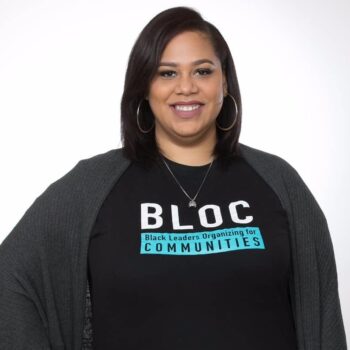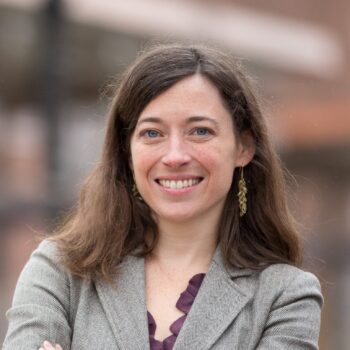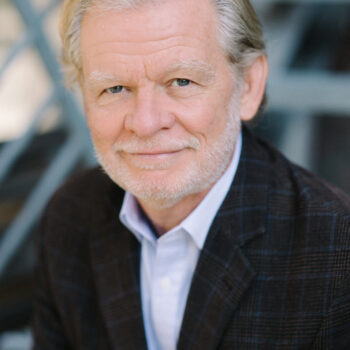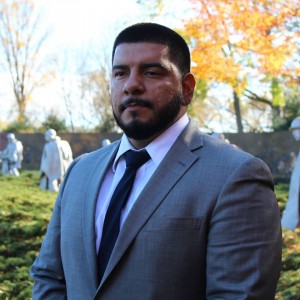Gara LaMarche talks with Angela Lang, executive director of BLOC in Wisconsin; Tomas Robles, Jr., executive director of LUCHA in Arizona; and Doran Schrantz, executive director of ISAIAH Minnesota, about their experiences with philanthropy, what true partnership might look like, and why it’s so critical for philanthropy to invest in self-sustaining funding for movement organizations. This interview has been edited and condensed.
Gara LaMarche: What have some of your best experiences with philanthropy been?
Angela Lang: The best relationships with philanthropy are when I feel it’s a partnership. Being able to work together around shared goals and metrics and being able to have honest conversations about what that takes. The people that actually see you and your organization and understand the work. There are some funders where you have to break down the role of grassroots organizations and year-round organizing for electoral politics — some people still need those dots connected. Having organizers in those roles, you don’t need to break that stuff down. They understand your time commitment; they’re not going to give you a thirty-page grant to fill out in two weeks. [They give you unrestricted funding] because [they] trust and value what you’re going to do with those funds. They want you to actually do the work instead of spending so much time doing the administrative stuff.
Doran Schrantz: I would 1,000 percent cosign on the strategic partnership. I think that defines the relationship that is most productive between a funder and a grantee. It’s not built around the idea that, essentially, I’m a supplicant to that entity. We’re sharing a vision about how to get that done. And then what’s even more powerful is when you get to the place where you feel we’re in a strategic partnership and we’re learning together about the field, about what would make the work better, about power. We are actually in a learning relationship with one another.
GL: I’ve sometimes felt funders use the language of partnership because they want to obscure the power dynamic which exists. So I’ve always felt there’s a lot of bullshit about partnership that comes from foundations. But you guys are saying that sometimes there are folks that you do feel are approaching you as partners?
DS: It is very rare. But it is possible. And frankly, I can count on one hand over the course of the last ten years people that felt like co-conspira[tors] about a vision, an agenda. They’re organizing funders; I’m organizing the people in our state. It’s like we’re trying to move an agenda together, and there is an explicit, transparent conversation about that power dynamic.
Tomas Robles: At LUCHA, a big frustration is that our reputation is not interchangeable with different donors. We can’t just show the work that we did and earn that trust. We’re still always in improving mode, no matter how big we get, no matter how influential we get, because there’s always going to be a new set of donors that wants to be wooed. There’s still a long way to go.
GL: National networks have relationships with national funders, and yet, you have direct relationships [as well].
DS: The community organizing independent political power organization in states has matured dramatically in the last ten years. As that maturing has happened, there are increasingly configurations in states that want to advocate or broker on their own behalf — and have the sophistication and capacity and know-how to do that. We can have our own direct relationships with the national philanthropic constellations. And there’s an inherent incentive on the national intermediary side to want to be the broker. Whether it’s a national organizing network, or any other entity, some of their currency is: I’m the pathway to LUCHA. But if LUCHA’s organizing on its own behalf, then what is the value being brought by the intermediary? And I think we’re in a re-negotiation about that.
GL: What are the things that foundations do that are counterproductive?
AL: There’s a conversation that some of us were having at CPD about how you perpetuate white supremacy culture in metrics. And how people don’t understand the power-building aspect of it. And so they want you to get a thousand pledge cards, and they’re very focused on numbers-based organizing but that doesn’t actually translate into real power, into movement building. And so there’s, I think, sometimes a disconnect in that.
There was a particular funder — it was very clear that they needed us more than we needed them. They needed to donate to us, they needed to give us money so they can say, “Look what we’re doing. Look, we’re helping the Black organization in a swing state.” But they gave a 15-page grant application, eleven point font. And a lot of it was things that they weren’t even going to fund. They wanted to know every aspect of every part of our programs when they were only funding a portion of it, which was really obnoxious. And I remember telling them, “I don’t have time for this. Either you shake this down, or we figure something out, or we don’t enter into a partnership.” And we ended up not, and they had to explain why they didn’t fund the Black political organization in the swing state. That’s their problem that they have to deal with.
Another thing is people wanting to bring money in late and then have you change your program to what they want to fund. We saw [this] last year with the same funder; it was electoral dollars. And that money ended up coming at the end of March, roughly two weeks before our election. I had to have a conversation about whether we were comfortable taking that money and completely changing our program in the last couple of weeks. We put our foot down and said, “Well, we have to evaluate if this is something that we can work into what we’re already doing.” After the fact, we’re hearing whispers of, “Well, BLOC would be stupid for not taking our money. Without us, they wouldn’t be where they are right now.” Those dynamics are really problematic.
GL: I keep hearing that late money continues to be a problem. And I know that has been talked about for years, and in some places it seems to be getting better, but is it still generally an issue of people not understanding the cycle and coming in much too late?
TR: Late money is always going to come in. At least we’ve accepted that fact. And Angela’s comment is correct, sometimes we’ve just got to say no. There’s power in saying no to funding. What we try to do is, whoever wants to give money late to us, explain how much more valuable this money would have been if they had given it earlier. Once the election is over, to showcase: this is what we could have done had your money come earlier versus, this is what we actually accomplished because the money came in late.
[During] COVID-19, some funding was only going to be given to us if we went door knocking. We had a Democratic Party that refused to door knock the entire cycle. And for our communities to be put in the front lines — [that] was something that we weren’t going to gamble with. So we said, you will find somebody else to take that money. And they did. Sometimes the power is in saying no.
AL: There’s still people [for whom] you have to spell out why year-round organizing yields electoral benefits. People still need to connect those dots. And then at the end of the day, sometimes, I find myself having to speak their language and say, “Look, if you want a return on investment with your $100,000, that will go a lot further if you give it to me a year out, where I can do that base-building work. In Wisconsin, I think the longest we go without an election is maybe eight months, if that. So we have elections all the damn time. And for whatever reason, people still aren’t getting how you can’t just have an electoral conversation and think that’s going to be it.
GL: What are ways of making a case for support that are effective? A lot of these donors don’t bother with power building. And it just seems crazy because it’s so short-sighted. But the reason money flows differently in elections is that there’s a whole consultant industrial complex whose livelihoods are based on that.
DS: Yes. It’s a lot of people making a lot of money off the technocratic industrial efficiency model. There’s a lot of self-interest in that. If you are a mail vendor or you’re a message machine person, you’re a digital firm, you want to use the Analyst Institute’s metrics to say there’s a ROI for this X percentage more. And therefore, you’re going to get a better return on your dollar. It’s just a really difficult space. That being said, I do think there are more people with influence asking much harder questions about what that’s producing in the long term and how much of it might be counterproductive even.
TR: Acronym is a perfect example of failing up. They completely botched the Iowa caucuses. They still got $90 million to run a digital voter registration campaign. For us, your strategy only works if you make some monumental achievement within an election, and then they start trusting your methods. And by then, it’s a five-year investment to even just start seeing stuff. Another data research organizing project that we’re trying to get donors to buy into, they want us to have 25,000 face-to-face conversations in three months. The impossibility of that from an organizing perspective, if you want to have deep, meaningful conversations. But that was their way of thinking. And so, yeah, there’s a humongous disconnect of folks getting rich while not having to show returns and us getting the tiniest amount but having to show three or four times an investment in terms of success.
AL: It always feels there’s more that we have to prove all the time. These DC consultant types are questioning the methods on the ground as if they are there. It’s wild.
GL: I never even heard the word metrics before I got to Atlantic Philanthropies, where they were originally very measurement obsessed and evaluation obsessed. We changed that in certain ways. If the funders didn’t exist, you would have ways of determining whether you were moving toward your goal. What’s the best way to look at that? And how do you look at that in the best funding relationships?
AL: I think it’s being able to leave it on the organization to talk about their own definition of success. A lot of times, people think of electoral success as just winning an election but not actually building power. And you have to tell people, even though we don’t win an election, our community is involved and engaged; that’s success for us. That may not be success for them because their agenda does not care about building power. It’s only about winning an election. And I think in a very logistical sense, having very open-ended questions. What is your definition of success? How do you think you are successful? What do you think your areas of growth could be based off of this?
There’s also a fundamental difference in how people view organizing. There’s the metrics-based organizing that says, “You’re not a good organizer unless you get ten new people a week or something.” Versus having those deeper, longer substantial conversations. There’s still a disconnect in how people view the work.
DS: That’s a legit question: how do we know if power is being built? And I don’t think there’s one answer to that question. It’s not, “Here’s the metric for we know we have power.” But there are legitimate ways we could be in a relationship across the field to say, we need to actually be in a learning process to define what we think, some of the aspects and dimensions that power building are, and how we know if we’re building it. In our last electoral program, we decided we wanted to measure: did we build more leaders who were organizing other people, and then did that produce something in terms of increase in voter turnout? There are different dimensions of how we can see the growth of a power organization or a social movement.
GL: It requires some understanding of what it means to build power and how eventually you win. And sometimes if you look at like, I don’t know, Texas of late, unlike, let’s say, Arizona or Wisconsin or Minnesota, you know the needle has been moving in the wrong direction for some reason. Is that because these investments are failing? Or because there are a lot of variables in an election? Or is it also because you’re holding people responsible when you chronically under-invest in them?
AL: Yeah, it’s always Black and brown communities’ fault when the election doesn’t go a particular way, when we’re dealing with scraps, right? I tell people all the time, we make $1 out of 15 cents. If we have the same resources as, say, the Democratic Party, imagine the amount of work that we could do. But BIPOC organizations have to just scrape by and work magic and miracles off of crumbs. It’s really frustrating, right? Because if the same election does go well, and the outcome was due to Black and brown people, everyone shares the victory. It wasn’t just Black and brown people; it was everyone. But best believe, if we lose, then we don’t share loss — it’s Black and brown people’s fault. When we are doing the best that we can with what we have.
TR: Or if we do win, they will ask, “Why didn’t one hundred percent of your people vote for us?” That’s the question we’re getting a ton right now: “Oh, so 27 percent of Latinos voted for Trump. Does that mean Latinos are moving away from Democratic policies?” No, it means you didn’t invest at all in those communities.
GL: Is there a future in which you can get adequately funded for the work without having to go on bended knee to these big donors? I sometimes wonder about whether inherent in [relying on philanthropy] is just a dependency on people who will only allow so much change but not enough change. I don’t know what the alternative future is to that. Right now, we’re just trying to make funders give more money and trust more.
TR: How we say [we have to] organize ourselves out of a job, fund yourselves out of having to fund us. Those self-sustaining revenue streams, land acquisition, so we have roots in the cities and states that we organize, helping us generate funds without needing you to generate. Because all it takes is one recession, really, one state to go a certain level blue for the infrastructure funding to dissipate. Until we’re able to completely be free from the need of foundations, they’re always going to control a certain power. And that’s why we’re constantly pushing. Don’t just fund us for the work we’re doing now, fund us for our vision. That’s what true partnership would look like.




